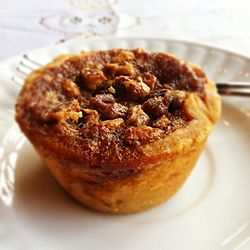Butter tart facts for kids

A pecan butter tart
|
|
| Type | Pastry |
|---|---|
| Course | Snack or Dessert |
| Place of origin | Canada |
| Main ingredients | Pastry shell, butter, sugar, syrup, eggs |
| Variations | Addition of raisins, walnuts or pecans or other flavourings |
| 580 kcal (2428 kJ) | |
A butter tart (which is tarte au beurre in French) is a small, sweet pastry tart. It's a very popular treat in Canada and is seen as one of the country's most famous desserts.
This yummy tart has a special filling made from butter, sugar, syrup, and egg. This filling is baked inside a pastry shell. When it's ready, the filling is partly solid and has a slightly crunchy top. It's important not to mix up a butter tart with a savoury "butter pie" from England or "bread and butter pudding."
Different families often have their own secret recipes for butter tarts. This means that butter tarts can look and feel a bit different. Some might have a firmer pastry, while others have a softer, gooier filling.
Traditionally, the butter tart has butter, sugar, and eggs in its pastry shell. It's a bit like the French-Canadian sugar pie or the base of a U.S. pecan pie. However, butter tarts don't use flour in the filling like sugar pies do. They also have a runnier filling than pecan pies because they don't use corn starch.
Sometimes, people add raisins, walnuts, or pecans to butter tarts. Whether raisins should be added is a big, fun debate across Canada! It's a truly iconic Canadian food.
Some bakers even create tarts with more unusual flavours. You might find butter tarts flavoured with maple, bacon, pumpkin, chili, or even salted caramel and cardamom. These unique flavours are often made for baking competitions.
The History of Butter Tarts
Butter tarts were a common food for early Canadian settlers. They are still a special pastry that is truly Canadian. People mostly eat and connect them with the English-speaking parts of Canada.
The butter tart might have come from other similar pies, such as:
- Border tart: A pie from the Scottish border that includes dried fruit.
- Sugar pie (tarte au sucre): This pie might have arrived with the "King's Daughters" in Quebec in the 1600s. These brides used maple syrup, butter, and dried fruit to make an early version of the butter tart.
- Pecan pie: This pie may have traveled north from the southern United States.
- Backwards pie: Found in the Maritimes and western Canada, it's made with corn syrup.
- Shoofly pie: This pie uses molasses and comes from the Pennsylvania Dutch community.
- Treacle tart: An English pastry made with golden syrup or treacle.
The first known Canadian recipe for a butter tart was published in 1900. It was found in The Women's Auxiliary of the Royal Victoria Hospital Cookbook in Barrie, Ontario. A woman named Mrs. Mary Ethel MacLeod sent in the recipe for the filling. This original cookbook is kept at the Simcoe County Archives. Another early recipe appeared in a 1915 pie cookbook. Butter tarts were a very important part of early Canadian cooking. They were often seen as a source of national pride.
Similar tarts are also made in Scotland. There, they are sometimes called Ecclefechan butter tarts, named after the town of Ecclefechan. In France, they are related to tarte à la frangipane. This French tart is similar but has ground almonds added to it.
Butter Tarts and Canadian Culture
Butter tarts are a big part of Eastern Canadian food. They are a source of pride for many towns and cities across Ontario and all of Canada. This strong connection has led to fun butter tart-themed events and tours.
Some examples include:
- The Butter Tart festival in Muskoka Lakes, Ontario.
- The "Butter Tart Trail" in Wellington North, Ontario.
- The "Kawarthas Northumberland Butter Tart Tour" in Kawarthas Northumberland, Ontario.
There was once a friendly disagreement, called "The Butter Tart Wars" by Canadian Living, between two groups. They settled it by agreeing to change the name of one tour to "Kawarthas Northumberland Butter Tart Tour." The first "Taste-Off" for this tour happened in Peterborough in 2013. Four bakeries won awards from a group of famous judges.
Ontario's Best Butter Tart Festival and Contest is an annual event. It takes place in Midland, Ontario. Bakers from all over Ontario come to compete. This festival is Canada's biggest celebration of butter tarts. In 2014, over 50,000 tarts were sold at the festival market!
National Geographic even wrote about how important butter tarts are. In 2013, they mentioned a stand in Wasaga Beach, Ontario. They said, "It's the homemade Canadian butter tarts – flaky crust with gooey pecan filling – that set this place apart from other lakeside ice cream stands."
In April 2019, a flood in Quebec slowed down butter tart production. This happened because a major bakery, Vachon in Sainte-Marie-de-Beauce, had to close due to the flood. By July, the bakery was slowly getting back to normal.
Canada Post celebrated the butter tart on April 17, 2019. They issued a special postage stamp as part of their "Sweet Canada" series. You can see it here: [1].
 | Frances Mary Albrier |
 | Whitney Young |
 | Muhammad Ali |

